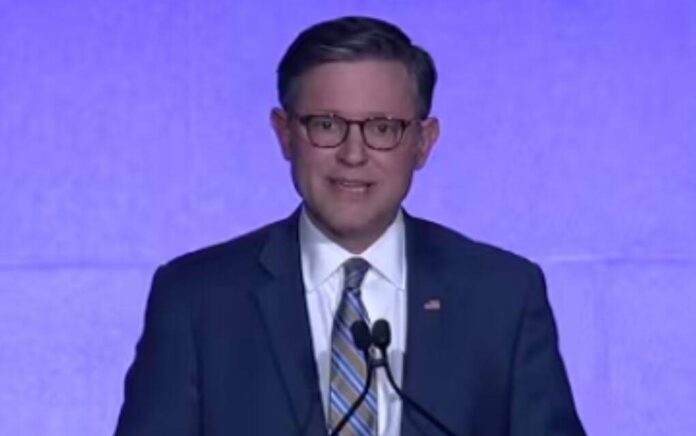
President Trump’s putting pressure on Congress. He needs them to take a critical move to help him.
And the U.S. House Speaker just dropped a whammy on President Trump that has the White House anxious.
Trump’s “Big, Beautiful Bill” Charges Toward Victory by Memorial Day, House Speaker Suggests
The Republican-led House is moving with purpose to deliver what President Donald Trump has called his “big, beautiful bill,” a sweeping legislative package that promises to cement his administration’s priorities into law. GOP leaders, radiating confidence, announced Tuesday that they expect the bill to pass by Memorial Day, a timeline that signals both ambition and efficiency. The legislation, which encapsulates Trump’s vision for economic growth, energy expansion, and fortified national security, is gaining momentum as it clears critical hurdles in Congress.
Seven of the 11 House committees tasked with reviewing the bill have already completed their work, a testament to the disciplined approach House Republicans have taken. The Natural Resources Committee is set to tackle its portion this week, keeping the process on track. This rapid progress is no accident—it’s the result of meticulous planning and a unified commitment to advancing Trump’s agenda. The bill’s scope is vast, touching on tax cuts, business incentives, energy production, and increased funding for defense and border security, all of which align with the administration’s focus on American strength and prosperity.
“We’re very encouraged and even excited this morning about where we are,” House Speaker Mike Johnson, R-La., said at the Capitol on Tuesday. His optimism is palpable, and for good reason. The bill is not just a collection of policies but a bold statement of intent from a Trump administration determined to deliver results. Johnson’s leadership has been instrumental in navigating the complexities of the legislative process, ensuring that each committee moves in lockstep toward the finish line.
The next phase of the bill’s journey involves the House Agriculture, Energy and Commerce, and Ways and Means Committees, which will take up the legislation next week. These committees are tasked with finalizing key components, including an extension of the tax cuts Trump enacted during his first term—a cornerstone of his economic legacy. The bill also includes incentives to spur domestic investment, an expansion of energy production sites, and robust funding for defense and border security. These measures are designed to bolster the economy, secure the nation’s borders, and assert America’s energy independence, all priorities that resonate deeply with Trump’s base.
A significant challenge looms in the Energy and Commerce Committee, which must identify $880 billion in cuts to balance the budget. According to the Congressional Budget Office, achieving this without touching Medicaid or the Children’s Health Insurance Program is nearly impossible. Yet, GOP leaders remain undeterred, framing the challenge as an opportunity to streamline and strengthen these programs. Johnson has emphasized that the focus will be on eliminating inefficiencies and ensuring that resources are directed to those who truly need them.
“We need to improve and shore up and strengthen the program so that it can be there for the people who desperately need and deserve it,” Johnson said. His plan involves rooting out fraud, waste, and abuse, including removing undocumented immigrants from Medicaid rolls. This approach not only addresses fiscal concerns but also aligns with the Trump administration’s commitment to prioritizing American citizens and restoring integrity to public programs.
The close collaboration between House GOP leaders and the White House has been a driving force behind the bill’s progress. Johnson and House Majority Leader Steve Scalise, R-La., met with Trump last Thursday, just before the president unveiled his 2026 budget proposal. This direct line of communication has ensured that the legislation remains true to Trump’s vision. The decision to delay action in the final three committees until next week, Johnson explained, stems from the need to finalize calculations on certain tax provisions—a cautious move to ensure precision in a bill of this magnitude.
Johnson acknowledged that not every House member will be thrilled with every detail of the bill. “Some House members are not going to be elated by every provision of the bill,” he said, emphasizing that consensus requires “balancing preferences.” This pragmatic approach demonstrates the GOP’s determination to prioritize the greater good over individual objections, a strategy that has kept the bill on course. The speaker’s commitment to getting it right, rather than rushing for the sake of speed, underscores the stakes involved.
“We didn’t want to move this quickly, with speed for the sake of speed,” Johnson said. “We want to get it right. In its totality, this is going to be the most important, most consequential legislation that we’ll ever be involved in in our lifetimes.” His words capture the gravity of the moment—a rare opportunity to enact transformative policies that will shape America’s future. As the bill moves closer to passage, the Trump administration and its allies in Congress are poised to deliver a legislative triumph that will reverberate for generations.
Voters Rally Behind Trump’s Tax Cuts as Congress Races to Make Them Permanent
A resounding 84% of likely voters are urging Congress to extend President Trump’s 2017 tax cuts before they expire this year, a new Public Opinion Strategies poll reveals. The survey, exclusively shared with The Post, shows a clear mandate for preserving the Tax Cuts and Jobs Act, with only 16% favoring a tax hike. As Congress scrambles to finalize what Trump has called a “big, beautiful” bill to lock in these provisions, the American public’s support signals strong backing for the administration’s economic vision.
The poll’s results cut across party lines, demonstrating widespread approval for maintaining current tax rates. “Voters overwhelmingly support extending the 2017 tax cuts, and they want Congress to act as soon as possible to make the extension of these cuts a reality,” wrote Public Opinion Strategies partner Jim Hobart. Republicans lead the charge with 95% in favor, followed by 81% of independents and a surprising 74% of Democrats. This unity among diverse voter groups suggests the tax cuts resonate deeply with Americans seeking financial relief.
Key demographics for the 2026 midterms—seniors, moderates, and suburban voters—also back the extension by margins exceeding 60%. “Letting these tax cuts expire is seen as hurting small businesses, middle class families, American consumers, and the economy as a whole,” Hobart noted. Roughly three-quarters of respondents believe allowing the cuts to lapse would harm middle-class families, small business owners, and consumers, reinforcing the stakes for Congress to act swiftly under Republican leadership.
Public sentiment against tax increases is equally stark. A striking 80% of voters say now is not the time to raise taxes, up four points since September, with only 3% supporting such a move. Additionally, 68% of respondents feel the federal government is taking too much of their income, compared to 32% who find current tax levels acceptable. This frustration aligns with the Trump administration’s push to ease financial burdens, a cornerstone of its economic agenda.
Republicans in Congress are seizing this momentum, proposing up to $1.5 trillion in spending cuts alongside measures to eliminate taxes on tips, overtime, and Social Security. “President Trump’s tax cuts were critical to delivering relief to the middle class and our Republican majority is ready to vote to make them permanent, while Democrats are fighting tooth-and-nail to force a $4 billion tax increase on hardworking Americans,” said Sen. Bernie Moreno (R-Ohio). Moreno also dismissed Democratic claims, affirming, “Despite lies from Democrats and their media allies, President Trump has been absolutely clear that cuts to Social Security and Medicaid are absolutely off the table.”
On addressing the $2 trillion federal budget deficit, voters favor practical solutions over tax hikes. Half (51%) support cutting federal spending, while 44% advocate for economic growth to boost revenues—only 5% endorse raising taxes. Treasury Secretary Scott Bessent emphasized the administration’s strategy: “We’ve got three legs to the president’s economic agenda—trade, tax, and deregulation—and we hope that we can have this tax portion done by Fourth of July.” House Speaker Mike Johnson (R-La.) aims to pass the bill by Memorial Day, leveraging budget reconciliation to counter Democratic opposition.
Despite Democratic criticism labeling the bill a boon for the wealthy, the poll—conducted April 10-14 with 1,000 likely voters and a credibility interval of +3.53%—shows robust public support. Commissioned by Americans for Prosperity as part of a $20 million campaign, the survey underscores the political potency of Trump’s tax policies. “Thus, it is no surprise that extending the 2017 cuts is a clear political winner with not just Republicans, but also with the swing voters who will be pivotal in the 2026 midterm elections,” Hobart concluded, signaling a strong tailwind for the administration’s economic priorities.
The Federalist Wire will update you on any further developments from Congress.



















